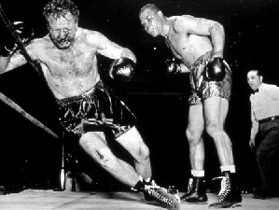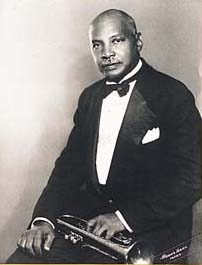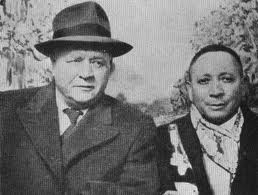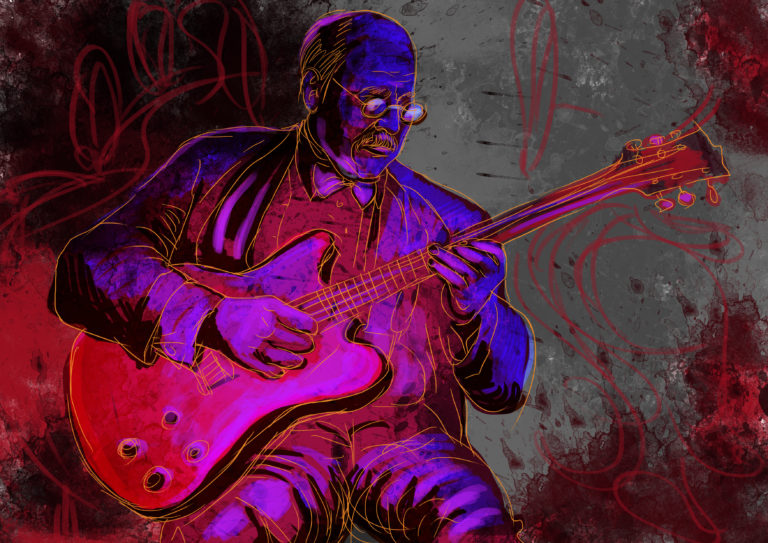1938’s HEAVYWEIGHT BLUES CLASH.
W.C. Handy and Jelly Roll Morton clash on paper as Joe Louis puts Nazis’ champ on canvas.

The following is an excerpt from America’s Gift, my book featuring over 200 years of blues history.
In March 1938, the famous African-American composer, publisher and blues pioneer, W. C. Handy, was introduced on Robert Ripley’s national U.S. radio show, ‘Believe It Or Not’, as the originator of blues and jazz.

Most people in America would have agreed with Ripley’s description, but one listener went ballistic.
This was the great jazz pianist and composer, Jelly Roll Morton, who felt the world deserved to know it was he, Jelly Roll, who should be hailed as the father of jazz, if not the father of blues. Jelly Roll seethed for five months about Ripley’s tribute to Handy, finally firing off a letter to Downbeat, the African-American magazine out of Chicago devoted to ‘blues, jazz and beyond’, written for hepcats by hepcats’.
Known for sensational headlines, Downbeat published Morton’s letter in its August 1938 edition under the headline, ‘I Created Jazz in 1902, Not W. C. Handy, Declares Jelly Roll Morton’.
Five days later, W. C.Handy fired off a measured reply, which appeared in the Downbeat of September 1938. ‘I Would Not Play Jazz if I Could, Writes Father of The Blues’, ran Downbeat’s headline. ‘W. C. Handy Says Jelly Roll’s Attack Is the “Act of a Crazy Man” ran the subhead.
Anyone trying to get a handle on the starting point of the blues should examine both letters, if only to assess what people were reading about the origins of blues and jazz back in 1938. After all, this was only 26 years since the first blues sheet music was published in 1912, and a measly 28 years after the term blues, as a musical genre, was first mentioned in the African-American press (in 1910). It might also be enlightening to read, first hand, the personal career details of two of the greatest musical icons of the twentieth century, as coming from their own pens.
For background, the letter exchange happened at the height of the Swing music craze then sweeping America. Significantly, the first rock & roll style blues records were also just being released at this time, even if the genre wouldn’t be named for another 14 years. But more about that later. First, here’s Jelly Roll Morton’s letter.
Jelly Roll Morton’s letter to Downbeat.
I Created Jazz in 1902, Not W. C. Handy, Declares Jelly Roll Morton
1 August, 1938
Dear Mr. Ripley,
For many years, I have been a constant reader of your (Believe It Or Not) cartoon. I have listened to your broadcast with keen interest. I frankly believe your work is a great contribution to natural science.
In your broadcast of March 26, 1938, you introduced W. C. Handy as the originator of jazz, stomps, and blues. By this announcement you have done me a great injustice, and you have also misled many of your fans.

It is evidently known, beyond contradiction, that New Orleans is the cradle of jazz, and I, myself, happened to be creator in the year 1902, many years before the Dixieland Band organized. Jazz music is a style, not compositions; any kind of music may be played in jazz, if one has the knowledge. The first stomp was written in 1906, namely ‘King Porter Stomp’. ‘Georgia Swing’ was the first to be named swing, in 1907.
You maybe informed by leading recording companies. ‘New Orleans Blues’ was written in 1905, the same year ‘Jelly Roll Blues’ was mapped out, but not published at that time. New Orleans was the headquarters for the greatest ragtime musicians on earth. There was more work than musicians. Everyone had their individual style. My style seemed to be the attraction. I decided to travel, and tried Mississippi, Alabama, Florida, Tennessee, Kentucky, Illinois, and many other states during 1903 and 1904, and was accepted as sensational.
In the year of 1908, I was brought to Memphis by a small theatre owner, Fred Barasso, as a feature attraction and to be with his number-one company for his circuit, which consisted of four houses, namely Memphis, Tenn., Greenville, Vicksburg, and Jackson, Mississippi. That was the birth of the negro theatrical circuit in the U.S.A.
It was that year I met Handy in Memphis. I learned that he had just arrived from his home town, Henderson, Ken. He was introduced to me as Professor Handy. Whoever heard of anyone wearing the name of Professor advocate ragtime, jazz, stomps, blues, etc.? Of course, Handy could not play either of these types, and I can assure you he has never learned them as yet (meaning freak tunes, plenty of finger-work in the groove of harmonies, great improvisations, accurate, exciting tempos with a kick). I know Mr. Handy’s ability, and it is the type of folk songs, hymns, anthems, etc. If you believe I am wrong, challenge his ability.
Professor Handy and his band played several days a week at a colored amusement park in Memphis, namely, Dixie Park. Guy Williams, a guitarist, worked in the band in 1911. He had a blues tune he wrote, called ‘Jogo Blues’. This tune was published by Pace and Handy under the same title, and was later changed to ‘St. Louis Blues’. Williams had no copyright as yet. In 1912, I happened to be in Texas, and one of my fellow musicians brought me a number to play – ‘Memphis Blues’. The minute I started playing it, I recognized it. I said to James Milles, the one who presented it to me (trombonist, still in Houston, playing with me at that time), “The first strain is a Black Butts’ strain all ‘dressed up’. Butts was strictly blues (or what they call a Boogie Woogie player). I said the second strain was mine. I practically assembled the tune. The last strain was Tony Jackson’s strain, Whoa B-Whoa. At that time, no one knew the meaning of the word jazz or stomps but me. This also added a new word to the dictionary to which they gave the wrong definition.
The word blues was known to everyone. For instance, when I was eight or nine years of age, I heard blues tunes entitled ‘Alice Fields’, ‘Isn’t It Hard To Love’, ‘Make Me A Palate On The Floor’ – the latter which I played myself on my guitar. Handy also re-titled his catalogue ‘Atlanta Blues’. Mr. Handy cannot prove anything is music that he has created. He has possibly taken advantage of some unprotected material that sometimes floats around. I would like to know how a person could be an originator of anything, without being able to do at least some of what they created.
I still claim that jazz hasn’t gotten to its peak as yet. I may be the only perfect specimen today in jazz that’s living. I guess I am 100 years ahead of my time. Jazz is a style, not a type of composition.
Please do not misunderstand me. I do not claim any of the creation of the blues, although I have written many of them even before Mr. Handy had any blues published. I had heard them when I was knee-high to a duck. For instance, when I first started going to school, at different times I would visit some of my relatives per permission, in the Garden district. I used to hear a few of the following blues players, who could play nothing else – Buddie Canter, Josky Adams, Game Kid, Frank Richards, Sam Henry, and many more too numerous to mention – they were what we call ‘ragmen’ in New Orleans. They can take a ten cent Xmas horn, take the wooden mouthpiece off, having only the metal for mouthpiece, and play more blues with that instrument than any trumpeter I had ever met through the country imitating the New Orleans trumpeters.
I hope that this letter will familiarize you more with real facts. You may display this in the most conspicuous places, it matters not to me. I played all Berlin’s tunes in jazz, which helped their possibilities greatly. I am enclosing you one of my many write-ups hoping this may help you in the authenticity of my statements. I am able to uphold all of my statements against any that may contradict. I barn-stormed from coast to coast before Art Hickman made his first trip from San Francisco to New York. That was long before Handy’s name was in the picture.
I think one should have conclusive proof before being able to claim a title. I also advocate much more rigid laws so thieves may get their just desserts. There are many who enjoy glory plus financial gain’s abundance, even in the millions, who should be digging ditches or sweeping the streets.

My dear Mr. Ripley, I also ask you for conclusive proof, which I am sure that you will never be able to offer, due to the fact that the one who inveigled you into this announcement cannot give you any. He doesn’t know anything about the foundation. New York itself is just beginning to get wise to jazz and all the decent dispensers either came from parts that I have educated or from tutors of the good New York musicians. Not until 1926 did they get a faint idea of real jazz, when I decided to live in New York. In spite of the fact that there were a few great dispensers – such as Sidney Bechet, clarinet, and William Brand, bass, – New York’s idea of jazz was taken from the dictionary’s definition – loud, blary, noise, discordant tones, etc., which really doesn’t spell jazz music. Music is supposed to be soothing, not unbearable – which was a specialty with most of them.
It is great to have ability from extreme to extreme, but it is terrible to have this kind of ability without the correct knowledge of how to use it. Very often you could hear the New York (supposed-to-be) jazz bands with 12 to 15 men. They would blaze away with all the volume that they had. Sometimes customers would have to hold their ears to protect their eardrums from a forced collision with their brains.
Later in the same tune, without notification, you could hear only drums and trumpet. Piano and guitar would be going but not heard. The others would be holding their instruments leisurely, talking, smoking reefers, chatting scandals, etc. Musicians of all nationalities watched the way I played; then soon I could hear my material everywhere I trod; but in an incorrect way, using figures behind a conglomeration of variations sometimes discordant, instead of hot swing melodies.
My contributions were many: First clown director, with witty sayings and flashily dressed, now called master of ceremonies; first glee club in orchestra; the first washboard was recorded by me; bass fiddle, drums – which was supposed to be impossible to record. I produced the fly swatter (they now call them brushes).
Of course many imitators arose after my being fired or quitting. I do not hold you responsible for this. I only give you facts that you may use for ammunition to force your pal to his rightful position in fair life.
Lord protect us from more Hitlers and Mussolinis.
Very truly yours,
Jelly Roll Morton
Originator of Jazz and Stomps, Victor Artist, World’s greatest Hot Tune writer.
W.C. Handy’s reply to Downbeat.

I Would Not Play Jazz even if I Could, Writes Father of the Blues
5 August 1938
Gentlemen:
In looking over DOWN BEAT I came across an article by Jelly Roll Morton captioned: “W. C. Handy is a Liar!”
For your information: Ripley had me on his program ‘Believe It or Not’, and Mr.Jelly Roll Morton wrote a similar article in the Baltimore Afro-American– a Negro Journal. In order to refute such statements by Jelly Roll Morton in the future, we obtained letters and statistics, etc., to make available to any newspaper that would carry such a scurrilous article. We have nothing much to fear from the Negro newspaper but when a paper like yours circulates lies ofJelly Roll’s concoction to musicians and other professional people, it is doing me not only an injustice but an injury that is irreparable.
If you want to be fair I am giving you material in this letter which you can assemble and use as a denial. I feel perfectly sure of my position in the musical world and of my ability as a pioneer, creative musician and composer.
I brought the quartet from Alabama to Chicago for the World’s Fair in 1893which sang native songs of my arrangements. I travelled with Maharas’ Minstrels that had its headquarters at the Winterburn Show Printing Co., of Chicago in1896, in which I arranged and played unusual unpublished Negro music. In 1897 Iled the band that started from the same address, giving our first performance at Belvidere, Ill., on August 4, 1896, and in Joliet, Ill., in 1897. I was then arranging music for band, orchestra and singers with my pen and later playedChicago at the Alhambra theatres where some of Chicago’s ablest musicians followed my band to hear us play original compositions like: ‘Armour Avenue’.This minstrel show travelled throughout the United States, Canada, Cuba, andMexico. I had the opportunity to hear what Negroes were playing in every city and hamlet all over the south and because of a knowledge of Negro music and because of my exceptional ability to write down the things peculiar to him, I created a new style of music which we now know as the ‘Blues’ and no one contested in these 25 years my copyrights which I own, nor challenged my ability until this jealous man comes along 25 years later.
I am sending you a copy of the ‘Jogo Blues’, which I as a musician and composer wrote which was an instrumental following up the success of the ‘Memphis Blues’ which I composed and wrote. In my early compositions I didn’t allow anyone to dot an ‘i’ or cross a ‘t’ other than myself. Now, out of this ‘Jogo Blues’ I took one strain and put words to it and composed the ‘St. Louis Blues’. Wrote the words and music myself. Made the orchestrations myself and, contrary to Mr.Morton’s statement that I was playing for colored people at Dixie Park, I played this composition atop of the Falls Bldg. in Memphis, at the Alaskan RoofGarden, which was an exclusive spot. My band played for the elite of Memphis throughout the South. Almost every state in the South, every Society affair. Idid control the music at Dixie Park and played there on Sundays but substituted musicians for other days.
The records of every steamboat, amusement park, dance hall, exclusive club in Memphis will reveal these facts. The Universities of Mississippi, Arkansas, Tennessee, Alabama, Georgia, Virginia, North Carolina and Kentucky will also substantiate these claims. Handy’s band was a household word throughout the Southland because we could play this music which we now call jazz better than any competitor.
Yes, I remember when Jelly Roll played for Barrossoin Memphis on colored what we call T.O.B.A. (Theatre Owners’ BookingAssociation) time. But we were too busy to take notice of his great musicianship. Guy Williams to whom he refers as the originator of the ‘Jogo Blues’, which I stole and called ‘St. Louis Blues’ was the guitarist in my No. 2 band. I never heard him create or play anything creative and if I had heard him and plagiarized his idea, he himself would have sought satisfaction 25 years ago.
When A & C. Bony, Inc., published my ‘Blues’ – An Anthology, I was invited to St. Louis to the convention of the American Book Publishers and autographed300 copies to guests. Guy Williams invited me to his home where I spent one week with him and his family which proved our friendly relationship and he always takes advantage of my visits to St. Louis, to extend such hospitality. Never once has he referred to my work other than original.
Morton says that up to 1925 St. Louis Blues was as dead as a doornail. I am sending you proof contradicting this statement in the form of a letter from Otto Zimmerman and he printed the first copies in 1914 and in which you will see that they printed 37,000 the first two years when I was down in Memphis.
In 1921, the Dixieland Jazz Band recorded ‘St.Louis Blues’ on the Victor records and their first statement which I am sending you was 179,440 plus 25,521, plus their third statement of 5,243 – records.That’s almost a quarter of a million records in 1921 from one phonograph company.
The Brunswick (company) in 1921 paid me for 39,981 records. In 1928 theColumbia Co., recorded 94,071 by Ted Lewis. In 1924 the Brunswick recorded30,472 records. In 1925 Columbia recorded 17,945, also in 1925 Columbia recorded 36,870 records by Bessie Smith. Add to these recordings on the Arto, Edison, Emerson, Pathe, Autophone, Grey Gull, Paramount, Pace Phonograph Co.,Banner, Regal, Little Wonder, etc., of the records they made and you will find that “St. Louis Blues” has had more recordings, sold more records, than any other American composition. With all these records being played in people’s homes before 1925 and with our tremendous sales of sheet music from 1914 on, say nothing about the piano rolls and vaudeville artists singing it from coast to coast on every stage and in every cabaret, how could he say that ‘St. LouisBlues’ was dead? It was because of the popularity of ‘St. Louis Blues’ that Mr.Melrose sent his representative, Henry Teller, to New York in an effort to acquire the dance orchestration rights only for ‘St. Louis Blues’ for the existing term of its copyright which expires in 1942.
We reserved the symphonic rights and have ready for publication now a symphonic suite in three movements for a standard symphony orchestra. Mr. Melrose was kind enough to write us a letter which we could use with the Afro-American. He refuted Jelly Roll’s statement, which we are sending you herewith attached. (See following letter.)
For the public’s information, you must know that I own the copyright to “St. Louis Blues” but have permitted arrangements for piano, accordion, all kinds of guitars, orchestras, etc., to be made and sold by firms that specialize along these lines. But they do not own the copyright to “St. Louis Blues.” I own that.
Jelly Roll Morton says I cannot play ‘Jazz’. I am 65 years old and would not play it if I could, but I did have the good sense to write down the laws of jazz and the music that lends itself to jazz and had vision enough to copyright and publish all the music I wrote so I don’t have to go around saying I made up this piece and that piece in such and such a year like Jelly Roll and then say somebody swiped it. Nobody has swiped anything from me. And, if he is as good as he says he is, he should have copyrighted and published his music so that he could not be running down deserving composers. If I didn’t know him I would think he is a crazy man to attack such fine men who have done outstanding work like Paul Whiteman, Duke Ellington. He reminds me of Capt. Higginson who wrote articles for The Saturday Evening Post and he said in one of these articles: “There was an old Negro on theMississippi River who played the fiddle away back before the Civil War and played the “Memphis Blues” and “St. Louis Blues” before Handy was born,” which ofcourse was fiction. I expect to hear such tirades as long as I am living but I don’t expect to see you print them and under such captions as the one in this issue.
Jelly Roll Morton is running true to form. Booker Washington always told a story in which he likened Negroes to crabs in a basket, when one was about to get out of the basket the other grabbed a hold of him and pulled him back.
Very truly yours
W. C. Handy
Walter Melrose’s letter to W. C. Handy

1587 Broadway
New York, N.Y.
7 May 1938
Dear Mr, Handy
Replying to your letter of recent date relative to an article published by the (Baltimore) Afro-American in which Jelly Roll Morton was credited with making certain claims in connection with your composition St. Louis Blues, I wish to say that I was indeed surprised thereto. In the first place Morton had nothing to do with my firm taking over your compositions for orchestra and band. They were accepted by me strictly on their merits and reputation. It is hard for me to understand why he made such a claim.
Sincerely yours
Walter Melrose






OK, this is incredible!! I heard about this little battle years ago, but it’s super cool to be able to read the actual letters they wrote. I LOVE a good deal of music by him, but Jelly Roll talks some major crap! He seems like the kind of guy that with a couple of drinks and people to compete in outlandish exaggerations with would claim he invented the wheel. He’s also well known for this.
Maybe it was because he felt backed into a corner, but Handy made some pretty sweeping claims in his letter too (“The records of every steamboat, amusement park, dance hall, exclusive club in Memphis…”). He talks about playing almost every society affair, etc. Who knows, maybe he is telling the truth. I’d be more inclined to believe that than any of Jelly Roll’s main claims.
Jelly Roll’s 1938 recording of King Porter Stomp for the Library of Congress is tied for my favorite recorded piano solo (shared with Hersal Blues by Hersal THomas) – nothing by Handy is even in my top 100 of any category. His band’s recordings ca. 1914 sound a bit sterile to me. BUT, they came out a full decade before Jelly Roll started his. My ears don’t take into account how original they may have seemed to a society that knew almost nothing too far beyond sterilized Victorian era music. To have grown up thinking “authentic black music” was the plantation skits from minstrel shows, then hearing the recordings of James Reece Europe or WC Handy I likely would have been heavily sucked in too. (No doubt the Original Dixieland Jazz Band would have been like lightning).
I guess that’s what this whole thing is getting at – who could lay claim to creating the music that was sweeping America – and more and more was coming to be the soundtrack for free society’s opposition to fascism.
This was a cool post!
Great insight, H, much of what I agree with. Take a listen to this W.C. Handy number recorded in London in 1916 which I believe is the first black blues recording anywhere.